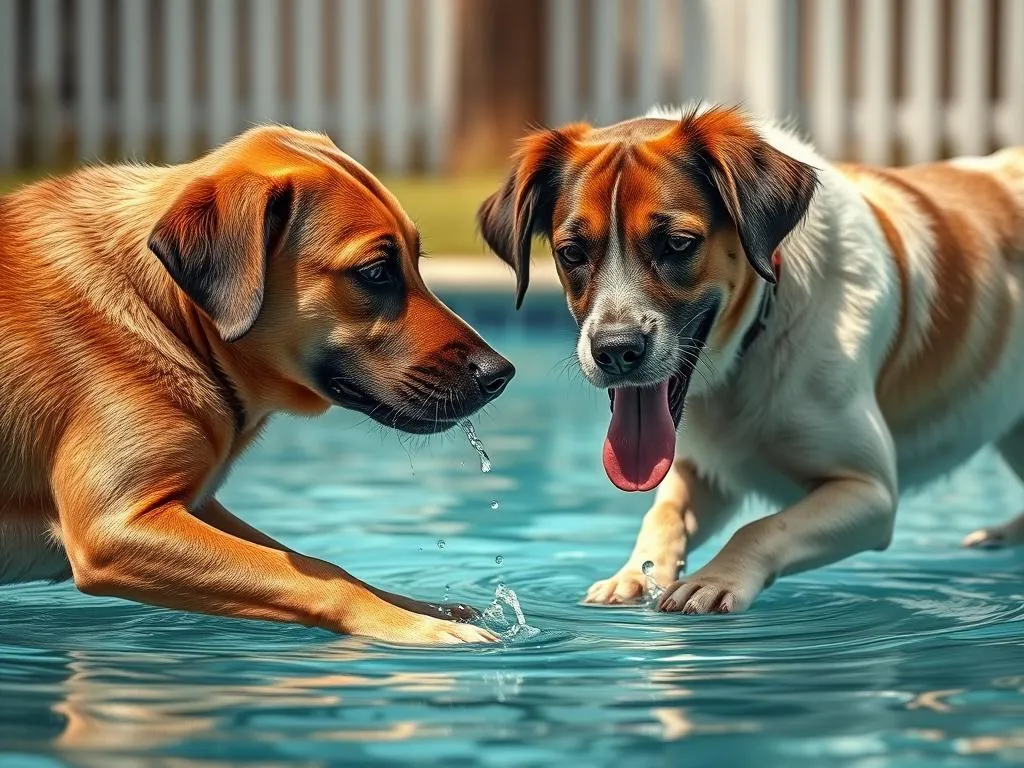
Introduction
Proper nutrition is essential for the health and well-being of our canine companions. Just like humans, dogs require a balanced diet that includes proteins, fats, carbohydrates, vitamins, and minerals. Each dog’s nutritional needs vary based on factors such as age, breed, size, and activity level. However, one often overlooked aspect of dog nutrition is hydration.
When it comes to hydration, a common question arises: can dogs drink pool water? This article aims to explore the implications of pool water consumption for dogs, discussing both the potential risks and benefits, as well as alternative hydration sources to keep your furry friend healthy and happy.
Understanding Dog Hydration Needs
General Hydration Requirements for Dogs
Dogs are generally recommended to drink approximately one ounce of water per pound of body weight each day. For instance, a 50-pound dog should consume about 50 ounces (or roughly 6 cups) of water daily. However, factors such as temperature, humidity, and activity level can influence these needs. Active dogs, particularly those who swim or exercise vigorously, may require even more water to stay hydrated.
It’s crucial for dog owners to be aware of the signs of dehydration. Common indicators include:
- Dry or sticky gums
- Excessive panting
- Lethargy or lack of energy
- Loss of skin elasticity (when skin is pinched, it doesn’t return to normal quickly)
- Reduced appetite
The Role of Water in Canine Health
Water plays a vital role in a dog’s overall health. It aids in digestion by helping to break down food and absorb nutrients. Water also contributes to circulation, enabling the transport of oxygen and nutrients throughout the body. Additionally, it helps regulate body temperature, particularly during hot weather or after exercise.
Composition of Pool Water
Chemical Components of Pool Water
Pool water is treated with various chemicals to ensure it remains clean and safe for swimming. The most common chemical is chlorine, which disinfects the water by killing harmful bacteria and other pathogens. However, the levels of chlorine and other disinfectants must be carefully balanced to maintain a safe pH level (typically between 7.2 and 7.8) and alkalinity.
Potential Contaminants
In addition to chlorine, pool water can harbor contaminants such as algae, bacteria, and chemicals from pool maintenance products (like algaecides). These contaminants can pose serious health risks to dogs if ingested.
Risks of Dogs Drinking Pool Water
Health Risks Associated with Chlorine
While small amounts of chlorine may not be harmful, dogs drinking pool water can lead to gastrointestinal irritation. Symptoms may include vomiting, diarrhea, and abdominal discomfort. Prolonged exposure to chlorine can have long-term effects, particularly for dogs who frequently swim in treated water.
Contamination Risks
The risk of illness increases significantly if a dog drinks pool water contaminated with bacteria or parasites. Common pathogens found in water include:
- E. coli
- Giardia
- Cryptosporidium
These can result in serious gastrointestinal issues and, in some cases, more severe health complications. Additionally, ingesting harmful chemicals from pool maintenance, such as algaecides or clarifiers, can lead to poisoning or other health concerns.
Signs of Illness in Dogs After Drinking Pool Water
If a dog consumes pool water, owners should monitor for signs of illness. Symptoms to watch for include:
- Vomiting
- Diarrhea
- Lethargy
- Loss of appetite
- Abdominal pain
If these symptoms occur, it’s crucial to consult a veterinarian for further evaluation and treatment.
Benefits of Swimming for Dogs
Physical Activity and Exercise
While drinking pool water poses risks, swimming can be an excellent form of exercise for dogs. Swimming is a low-impact activity that provides a full-body workout, promoting muscle strength and cardiovascular health. Additionally, it is suitable for a variety of breeds, including those with joint issues or mobility challenges.
Mental Stimulation and Enjoyment
Water play can also be a significant source of mental stimulation for dogs. Many dogs enjoy swimming and playing in water, which can enhance their overall happiness. Engaging in water activities can help alleviate boredom and reduce behavioral problems.
Alternatives to Pool Water
Safe Hydration Options for Dogs
To ensure proper hydration, it’s essential to provide dogs with fresh, clean water at all times. Here are some recommendations for effective hydration:
- Water Bowls: Use stainless steel or ceramic bowls that are easy to clean. Ensure that your dog has access to water both indoors and outdoors.
- Flavored Water: Some companies offer dog-friendly flavored water, which can entice picky drinkers to stay hydrated.
Hydration During Outdoor Activities
When engaging in outdoor activities like swimming or hiking, it’s important to keep your dog hydrated. Here are some tips:
- Portable Water Bowls: Carry collapsible water bowls that can be filled easily on the go.
- Frequent Breaks: Allow your dog to take regular breaks to drink water, especially during hot weather or strenuous activities.
How to Safely Introduce Your Dog to Water
Tips for Introducing Dogs to Pools or Water
If you want to introduce your dog to swimming, do so gradually. Here are some tips to ensure a positive experience:
- Gradual Exposure: Start by letting your dog explore shallow water before transitioning to deeper areas.
- Positive Reinforcement: Use treats and praise to reward your dog for entering the water and swimming.
Safety Precautions While Swimming
Safety should always be a priority when introducing your dog to water. Consider these precautions:
- Life Jackets: For dogs who are not strong swimmers or are new to water, consider using a dog life jacket.
- Supervision: Always supervise your dog while they are in or near water to ensure their safety and well-being.
Conclusion
In summary, while the question of can dogs drink pool water raises valid concerns, the risks often outweigh any potential benefits. Chlorine and contaminants can lead to gastrointestinal problems and other serious health issues. Instead, prioritize safe hydration options by providing your dog with fresh water and exploring dog-friendly hydration products.
It’s essential to keep your canine companion healthy and hydrated, especially during outdoor activities. Swimming can be a fun way to exercise and bond with your dog, but always prioritize safety and monitor for any signs of distress or illness.
FAQs
Can dogs swim in the pool?
Yes, dogs can swim in pools, but it’s essential to supervise them and ensure that the pool is free from harmful chemicals or contaminants.
What should I do if my dog drinks pool water?
If your dog drinks pool water, monitor for signs of illness such as vomiting, diarrhea, or lethargy. If symptoms arise, consult a veterinarian.
Are there any safe swimming pools for dogs?
Some facilities offer dog-friendly swimming pools designed specifically for canine use. These pools are typically maintained with safe chemicals and are free from harmful contaminants.









